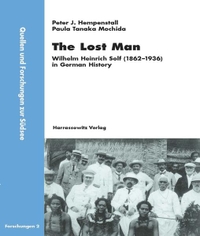Peter J. Hempenstall, Paula T. Mochida
The Lost Man - Wilhelm Solf in German History

Harrassowitz Verlag, Wiesbaden 2005
ISBN 9783447051347
Paperback, 285 Seiten, 68,00 EUR
ISBN 9783447051347
Paperback, 285 Seiten, 68,00 EUR
Klappentext
This new and innovative biography portrays the life of Wilhelm Heinrich Solf, a man who lived from Bismarck to Hitler (1862-1936), and whose life was deeply entangled with the ups and downs of Germanys domestic and in particular foreign and international policies.
Solf went from carving out a name for himself as a liberal - and successful - colonial Governor to becoming the imperial colonial minister of the Kaiserreich before World War I. During the war he struggled to influence the Kaisers ruling circle away from its aggressive military policies towards a negotiated peace, rising to become imperial Germanys last Foreign Minister. He was appointed Weimars ambassador to Japan, and turned out to be the Republics most successful and cultured diplomat overseas, restoring the relationship between the two former enemies. On his return to Germany, Solf became involved with several political attempts to forestall Hitlers rise to power. He and his family worked against the Nazis anti-Semitic policies. In fact the Solf circle became an important opposition group. After Solfs death his wife, Hanna, and daughter Lagi (who was born in Samoa) continued this work and were imprisoned by the Nazis. While their accomplices were executed during the war, the Solf women escaped by the barest of margins as the Russians invaded Berlin in the last stages of the war. (Text in English with a German summary)
Solf went from carving out a name for himself as a liberal - and successful - colonial Governor to becoming the imperial colonial minister of the Kaiserreich before World War I. During the war he struggled to influence the Kaisers ruling circle away from its aggressive military policies towards a negotiated peace, rising to become imperial Germanys last Foreign Minister. He was appointed Weimars ambassador to Japan, and turned out to be the Republics most successful and cultured diplomat overseas, restoring the relationship between the two former enemies. On his return to Germany, Solf became involved with several political attempts to forestall Hitlers rise to power. He and his family worked against the Nazis anti-Semitic policies. In fact the Solf circle became an important opposition group. After Solfs death his wife, Hanna, and daughter Lagi (who was born in Samoa) continued this work and were imprisoned by the Nazis. While their accomplices were executed during the war, the Solf women escaped by the barest of margins as the Russians invaded Berlin in the last stages of the war. (Text in English with a German summary)
Rezensionsnotiz zu Frankfurter Allgemeine Zeitung, 12.09.2005
Als "prägnantes, einfühlsames Lebensbild" lobt Hans Jochen Pretsch dieses Buch über Wilhelm Solf, der als Gouverneur in Samoa von 1899 bis 1910, als Staatssekretär des Reichskolonialamtes von 1911 bis 1918 und des Auswärtigen Amtes Ende 1918 sowie als Botschafter in Tokio von 1920 bis 1928 im Fernen Osten in guter Erinnerung blieb. Die Autoren, Peter J. Hempenstall und Paula Tanaka Mochida, ein australischer Historiker aus Neuseeland und eine amerikanische Bibliothekarin japanischer Abstammung aus Hawaii, habe die Biographie dieses hohen deutschen Beamten jedenfalls fasziniert. Pretsch hebt hervor, dass sie in jahrzehntelangen Recherchen Quellen im Bundesarchiv, im Politischen Archiv des Auswärtigen Amtes, im Geheimen Staatsarchiv Stiftung Preußischer Kulturbesitz und im Staatsarchiv Wellington sowie im Familienbesitz befindliche Unterlagen ausgewertet haben. Entstanden sei ein "persönlich gehaltenes Werk", das Solfs Wirken und Persönlichkeit im Feuilleton-Stil ebenso skizziere wie die deutsche Historiografie über Solf und Impressionen zu den Archivstudien im wiedervereinigten Deutschland. Grundlegend Neues erfährt man nach Ansicht Pretschs in dieser Studie zwar nicht. Aber er würdigt sie als eine "willkommene Ergänzung" zur älteren Biographie von Eberhard von Vietsch, da sie auch das familiäre Umfeld Solfs und dessen Ehe schildere.
Lesen Sie die Rezension bei
buecher.deThemengebiete
Kommentieren







